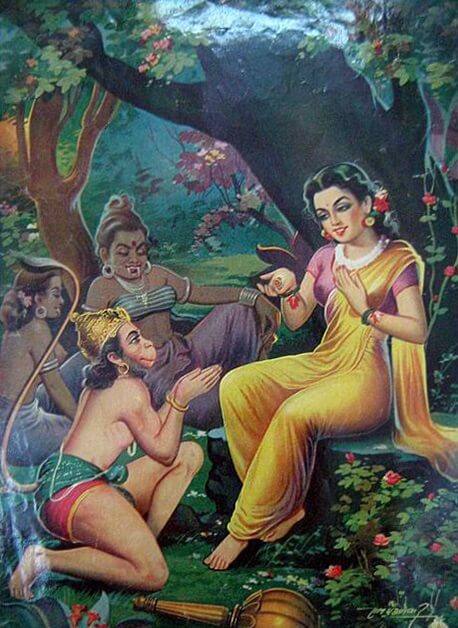Ramayana contained many subjects useful to human life. Originally, the verses were written by Valmiki Maharshi for teaching the children Lava and Kusha. The epic had been presented by him for the use of mankind later. At any time, to regularize the problems of life and to solve them as a reader would be possible after reading it. Researches had been done by the Indian Rishis in the field of dreams, realities and their mutual relevance and the necessities of such dreams also, centuries back. In Ramayana, dreams are referred many times and a few cases could be read as follows, for our knowledge. One must get some benefit by reading Ramayana.

Rama was ready to go exile, Sita walked ahead and Lakshmana followed. Then, entire people of Ayodhya city felt very sad for the havoc situation. Dasharatha had expired and Shatrughna had conducted the rituals as per instructions of Vasishta. Kaikeyi with other queens felt very sorry. Prince Bharata was at his uncle’s ancestral house. Vasishta had sent through messengers to Bharata to return to Ayodhya at the earliest. Vasishta had specially requested with those messengers not to reveal to him anything about the incidences in Ayodhya but his presence was required immediately by Vasishta to fulfill diplomatic necessities.
The messengers had reached, in the early morning, at the palace of Ashwapathi, the king of Kekaya kingdom. Bharata had just awakened from sleep. He was already afraid since he had bad dreams. When he saw the messengers, he was thinking about his people at Ayodhya.
स्वप्ने पितरमद्राक्षं मलिनं मुक्त मूर्धजं । पतंतमद्रि शिखरात्पतितं गोमय ह्रदे ॥
Meaning: I had seen bad dreams about Ayodhya. I had seen my father wearing dirty cloths, falling from mountains and reached into the pit of cow dung. Bharata was very eager to know about his father.
स्वप्ने ऽपि सागरं शुष्कं चन्द्रं च पतितं भुवि । उपरुद्घां च जगतीं तमसेव समावृताम् ॥
Meaning: I had dreams. I had seen empty dried up oceans. The Moon had fallen on the Earth, The entire world was covered with darkness only. Bharata was in the hangover of the dreams.
शुष्कते ऽतीव मे कण्ठो न स्वस्थमिव मे मनः । अहम् रामो ऽथवा राजा लक्ष्मणो वा मरिष्यति ॥
Meaning: My throats are getting dried. My heart had no tranquility. I feel I could die. Or Rama, King Dasharatha or Lakshmana would die. Bharata felt very bad, due to his dreams.
आर्या च धर्म निरता धर्मज्ञा धर्म दर्शिनी । अरोगा चापि कौसल्या माता रामस्य धीमतः ॥
Meaning: There should not be any ill health, in the case of Kausalya, the mother of Rama, who was intelligent, civilized, Dharmajna, and used to guide others regarding the Dharma, safe guarding everybody. She was always dedicated to Dharma.
आत्मकामा सदाचण्डी क्रोधना प्राज्ञ मानिनी । अरोगा चापि कैकेयी माता मे किमुवाच हि ॥
Meaning: There should not be any ill health, in the case of my mother, Kaikeyi, who was always honored, desiring selfishness, always arrogant, getting angry quickly, and what she would have told.
Bharata had dreamt badly. His mind was getting ready, to be prepared, to face the difficult situations. It was in the early morning. Anticipating the adverse results, he hurried to Ayodhya. One could judge the results of his dream.
Prashnamargam is a book on Astrology. The above verses were available in the final chapter on dreams and their astrological decoding. The above compilation had been taken from Valmiki Ramayana. These verses were repeated for the study on dreams and their decoding with respect to astrological aspects.
In the Sundara kanda of Valmiki Ramayana, the first meeting of Hanuman with Sita had been explained. Hanuman had seen Sita for the first time, and he was planning to introduce himself to Sita. Momentarily, he thought, to speak with her in Sanskrit prose with simple words:
अहं त्वतितनुश्चैव वानरश्च विशेषतः । वाचं चोदाहरिश्यामि मानुषीमिव संस्कृतां ॥
The meaning: Hanuman thought, I could display shrinking myself, having a very short body, like a monkey, and I could speak words in Sanskrit prose and pretend like a man.
But immediately Hanuman thought of the surroundings. He could see Trijata, the wife of Vibhishana, sitting below. Vibhishana was a good person and he used to eat vegetarian food only at his residence. He was a devotee of Rama. Then, the premises were Ashokavana. It was looked after by Trijata and she was in charge of night security to Sita. For more than three months, Trijata had supplied food for Sita as she could worship Rama at her residence daily and part of the offerings was brought to Sita at night.
When Hanuman wished to communicate his presence to Sita in Sanskrit prose, he thought it could create problems and Sita would think by looking at his body in the night as Ravana had come in disguise to cheat her.
यदि वाचं प्रदास्यामि द्विजातिरिव संस्कृतां । रावणं मन्यमाना मां सीता भीता भविष्यति ॥
Meaning: If I put words like a scholar, in Sanskrit prose, Sita would think me as Ravana had come in disguise to cheat her and she would be afraid of me.
Then Hanuman decided to recite himself the song of Ramayana by composing it in brief in sixteen verses, the events, till narrating, his first meeting with Sita. He used such tactics so as to hear the melodious verses only by Sita but not making much sound. These sixteen verses were found in the thirty-first Sarga of Sundarakanda of Ramayana. Hanuman repeated these sixteen verses until his sweet songs, could pull the attention of Sita.
Sita was suffering under great sorrows, drowsy in the late night time. When she heard the musical voice of Hanuman, and had seen him in the form of a small monkey, she could not believe it as reality and guessed it could be a dream and she might be sleeping.
स्वप्ने मयायम् विकृतो ऽद्य दृष्टः शाखामृगः शास्त्रगणैर्निषिद्धः । स्वस्त्यस्तु रामाय स लक्ष्मणाय तथा पितुर्मे जनकस्य राज्ञः ॥
Meaning: In this dream I had seen an animal which dwells on the branches of trees of which sciences decline as barred scenery. Let Rama, Lakshmana and my father, the king Janaka, live under peace and happiness, despite this bad omen.
Sita then again heard the melodious song of reality, Ramayana from the mouth of Hanuman. She started thinking in reflections herself. She started thinking of the handsome face of Rama and she could compare it with a bright full Moon.
स्वप्नोऽहि नायं नहि मेऽस्ति निद्रा शोकेन दुःखेनच पीडितायाः । सुखं हि मे नास्ति यथाऽस्मि रामेति तेनेन्दुपूर्ण प्रतिमाननेन ॥
Meaning: This could not be a dream. When I had not slept, I could not see a dream. I am suffering from sleeplessness. I am suffering from grievances. I had regretted myself. There is no happiness for me. I am living as simple as reality. I think of Rama and his face appears to me like a bright full Moon.
After hearing the song of Ramayana from the mouth of Hanuman, Sita understood the reality and believed him and obtained the gold ring of Rama from his hand and in exchange offered to Rama, her golden hair clip to deliver by him. She found the reality and understood the capacity of Hanuman.
Later, Sita could return to Ayodhya along with Rama and Lakshmana, when the war between Rama and Ravana were over and Rama killed Ravana.
Oneirology deals with the scientific study of dreams and their consequences on human life. It had recently captured the position as a branch of science in foreign countries but in India many references were available in the old epics, but they were written in Sanskrit.
It is humbly prayed for the blessings of God Rama upon us.
Next post, being of Active Angada in Ramayana may not be missed. Eight Chiranjeevis of Indian Epics would be presented separately in another article.
Readers may provide feedback and share this story with friends and family.

Leave a Reply